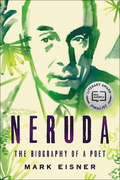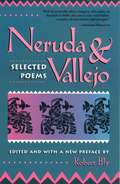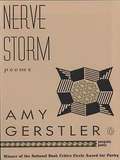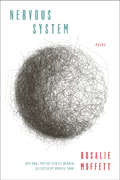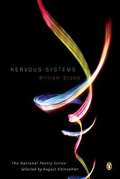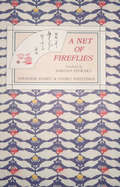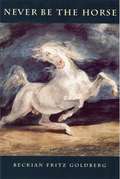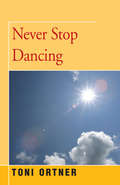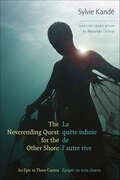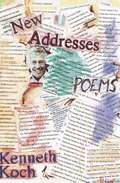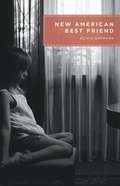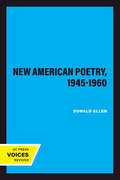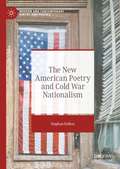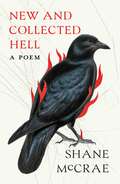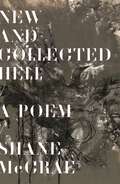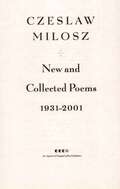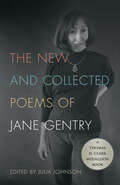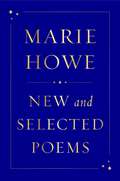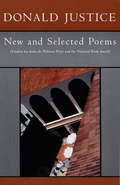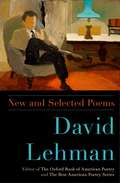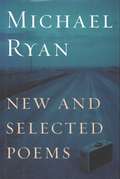- Table View
- List View
Neruda: The Poet's Calling
by Mark EisnerThe most definitive biography to date of the poet Pablo Neruda, a moving portrait of one of the most intriguing and influential figures in Latin American historyFew poets have captured the global imagination like Pablo Neruda. In his native Chile, across Latin America, and in many other parts of the world, his name and legacy have become almost synonymous with liberation movements, and with the language of erotic love. Neruda: The Poet’s Calling is the product of fifteen years of research by Mark Eisner, writer, translator, and documentary filmmaker. The book vividly depicts Neruda’s monumental life, potent verse, and ardent belief in the “poet’s obligation” to use poetry for social good. It braids together three major strands of Neruda’s life—his world-revered poetry; his political engagement; and his tumultuous, even controversial, personal life—forming a single cohesive narrative of intimacy and breadth.The fascinating events of Neruda’s life are interspersed with Eisner’s thoughtful examinations of the poems, both as works of art in their own right and as mirrors of Neruda’s life and times. The result is a book that animates Neruda’s riveting story in a new way—one that offers a compelling narrative version of Neruda’s life and work, undergirded by exhaustive research, yet designed to bring this colossal literary figure to a broader audience.
Neruda and Vallejo: Selected Poems
by Robert Bly"Chilean Pablo Neruda is Latin America's greatest poet and one of the finest ever to have written in the Spanish language. The Peruvian poet, Cesar Vallejo, part Indian and born in a mining village, ranks not far below Neruda. Robert Bly is one of America's foremost poets, and a translator of uncommon brilliance. The combination makes for a priceless volume."--Long Beach Press Telegram.
Nerve Storm
by Amy GerstlerIn her first collection since Bitter Angel, which won the 1991 National Book Critics Circle Award, Gerstler continues her intense, and often savage, pursuit of redemption through suffering. At times pain is caused by illness (scarlet fever, tuberculosis), at times by man's inhumanity to man (the Holocaust; bodies are recovered from an unspecified explosion). Past and present blur as one speaker is followed through various reincarnations in a single poem. A cow lazily chewing grass insists that Prior to this promotion/ I was the town drunk. Her best poems are relentless, soul-searching, surreal and wonderfully inexplicable. But less than half this volume displays vintage Gerstler. At their weakest, her poems are formulaic and contrived, as when she catalogues matriarchal saints for modern times (Our lady of organ transplants. / Our lady of the power lunch). A five-page poem about insect collecting (possibly a found poem lifted from various manuals) is pointless. Most damaging is her ability to trivialize the same themes she presents so potently elsewhere, as when the speaker of one poem gives instructions on survival to a potentially homeless person. Whether a poem is sympathizing or mocking, the meter and the poet's distanced gaze remain the same, frequently leaving readers uncertain of the poet's intentions.
Nervous System: Poems
by Rosalie MoffettA moving and kinetic collection of poetry from the 2018 winner of the National Poetry Series, selected by Monica YounUnexpected, unusual, and stirring, the poetry of Rosalie Moffett “takes us to the brink of a world continually unmaking itself,” (Georgia Review). From diving-bell spiders to the nervous system of the human body, from trees growing so heavy with fruit that they split to dogs galloping through snowy hills, Moffett’s world is rendered with precision, intricacy, and extraordinary beauty.Exhilarating in its technical expertise but also steeped in a profound connection to the natural world and the human psyche, Nervous System is a collection from a major emerging voice.
Nervous Systems
by William StobbSelected for the 2006 National Poetry Series by August Kleinzahler William Stobb?s poems attend calmly to a dynamic world. Nature, family, and friends are among the shifting systems where Stobb finds poems. His fluency in a variety of forms?from the measured tenderness of Jay Meek to the oceanic surrealism of Donald Revell?enacts the tension between order and entropy in the physical world we live in. ?Stobb has nerve, talent, and engages this madly accelerating, and often nearly indecipherable, world in what?s called real time,? writes August Kleinzahler, ?and he manages it without sacrificing emotional truth. ? .
A Net of Fireflies
by Harold StewartA Net of Fireflies is a Collection of Japanese Haiku and Haiku paintings.
A Net of Fireflies
by Harold StewartA Net of Fireflies is a Collection of Japanese Haiku and Haiku paintings.
Never Be the Horse (1st edition)
by Beckian Fritz GoldbergThe poems depict the world of a postmodern Dark Dorothy whose attempts to return home are foiled when she falls into the Garden of Eden, into the underworld with Walt Whitman, into mysterious versions of her own childhood.
Never Stop Dancing
by Toni Ortner"The chapbook is about the experience of being in a mental hospital although it could have been about being in any kind of prison. The specifics are here, and it is well written. "-Judy Hogan, "Motheroot Journal" a women's review of small presses"
Never Tease a Weasel
by Jean Conder SouleReading this book together is an excellent and fun way to learn about teasing. " You can knit a kitten mittens And perhaps that cat would purr. You could fit a fox with socks That exactly matched his fur. ... But never tease a weasel; This is very good advice. A weasel will not like it And teasing isn't nice!" This file should make an excellent embossed braille copy.
The Neverending Quest for the Other Shore: An Epic in Three Cantos (Wesleyan Poetry Series)
by Sylvie KandéSylvie Kandé's neo-epic in three cantos is a double narrative combining today's tales of African migration to Europe on the one hand, with the legend of Abubakar II on the other: Abubakar, emperor of 14th-Century Mali, sailed West toward the new world, never to return. Kandé's language deftly weaves a dialogue between these two narratives and between the epic traditions of the globe. Dazzling in its scope, the poem swings between epic stylization, griot storytelling, and colloquial banter, capturing an astonishing range of human experience. Kandé makes of the migrant a new hero, a future hero whose destiny has not yet taken shape, whose stories are still waiting to be told in their fullness and grandeur: the neverending quest has only just begun. Country folk who made themselves belated marinerstheir bodies cadence themto cleave with the oar's tainted tipthe purple mounds of the great salt savannahwhich no furrow markswhere no seed takes root (But to say the seaearthly words are little suited)At the point of the dreamthey were a myriadno less and no moreto cross the coral barrier in laughter with its vermilion flowers:there remain but three barks adriftfull so full to the point of capsizing
New Addresses
by Kenneth KochKenneth Koch, who has already considerably "stretched our ideas of what it is possible to do in poetry" (David Lehman), here takes on the classic poetic device of apostrophe, or direct address. His use of it gives him yet another chance to say things never said before in prose or in verse and, as well, to bring new life to a form in which Donne talked to Death, Shelley to the West Wind, Whitman to the Earth, Pound to his Songs, O'Hara to the Sun at Fire Island. Koch, in this new book, talks to things important in his life -- to Breath, to World War Two, to Orgasms, to the French Language, to Jewishness, to Psychoanalysis, to Sleep, to his Heart, to Friendship, to High Spirits, to his Twenties, to the Unknown. He makes of all these "new addresses" an exhilarating autobiography of a most surprising and unforeseeable kind.From the Hardcover edition.
New American Best Friend
by Olivia GatwoodOne of the most recognisable young poets in America, Olivia Gatwood dazzles with her tribute to contemporary American womanhood in her debut book, New American Best Friend. <P><P>Gatwood's poems deftly deconstruct traditional stereotypes. The focus shifts from childhood to adulthood, gender to sexuality, violence to joy. <P><P> And always and inexorably, the book moves toward celebration, culminating in a series of odes: odes to the body, to tough women, to embracing your own journey in all its failures and triumphs.
The New American Poetry, 1945-1960
by Donald AllenWith more than 100,000 copies sold, The New American Poetry has become one of the most influential anthologies published in the United States since World War II. As one of the first counter-cultural collections of American verse, this volume fits in Robert Lowell's famous definition of the raw in American poetry. Many of the contributors once derided in the mainstream press of the period are now part of the postmodern canon: Olson, Duncan, Creeley, Guest, Ashbery, Ginsberg, Kerouac, Levertov, O'Hara, Snyder, Schuyler, and others. Donald Allen's The New American Poetry delivered the first taste of these remarkable poets, and the book has since become an invaluable historical and cultural record, now available again for a new generation of readers.
The New American Poetry and Cold War Nationalism (Modern and Contemporary Poetry and Poetics)
by Stephan DelbosThis book examines Donald M. Allen’s crucially influential poetry anthology The New American Poetry, 1945–1960 from the perspectives of American Cold War nationalism and literary transnationalism, considering how the anthology expresses and challenges Cold War norms, claiming post-war Anglophone poetic innovation for the United States and reflecting the conservative American society of the 1950s. Examining the crossroads of politics, social life, and literature during the Cold War, this book puts Allen’s anthology into its historical context and reveals how the editor was influenced by the volatile climate of nationalism and politics that pervaded every aspect of American life during the Cold War. Reconsidering the dramatic influence that Allen’s anthology has had on the way we think about and anthologize American poetry, and recontextualizing The New American Poetry as a document of the Cold War, this study not only helps us come to a more accurate understanding of how the anthology came into being, but also encourages new ways of thinking about all of Anglophone poetry, from the twentieth century and today.
New and Collected Hell: A Poem
by Shane McCraeAward winning poet of our times Shane McCrae, 'peer to the peerless' (New York Journal of Books), takes up and turns on its head the mantle of Dante in this contemporary vision of Hell.Of death the muse is death the muse of HellIs death the muse of Heaven I don't knowO muse of where howcan I hope to goTo where I pray I'll go sing at least tellShane McCrae, one of the most prophetic and powerful poetic voices of our time, has created a twenty-first-century epic in New and Collected Hell. As David Woo wrote in Poetry, 'McCrae's poems allude to literary precursors like Dante, Milton, and the Bible, but the voice is unabashedly of our time . . . By seeking to heal the rift in his own identity, McCrae has listened intently to the literary echoes emanating from the English language and transmuted them through his own dynamic voice.' Here, he gathers new and previous work as a culmination of his long-standing poetic project: a new and unforgettable journey through Hell. McCrae's work is indelible, and this collection brings his searing vision to new depths.
New and Collected Hell: A Poem
by Shane McCraeShane McCrae, “peer to the peerless” (New York Journal of Books), takes up and turns on its head the mantle of Dante in this contemporary vision of Hell.Of death the muse is death the muse of HellIs death the muse of Heaven I don’t knowO muse of where howcan I hope to goTo where I pray I’ll go sing at least tellShane McCrae, one of the most prophetic and powerful poetic voices of our time, has created a twenty-first-century epic in New and Collected Hell. As David Woo wrote in Poetry, “McCrae’s poems allude to literary precursors like Dante, Milton, and the Bible, but the voice is unabashedly of our time . . . By seeking to heal the rift in his own identity, McCrae has listened intently to the literary echoes emanating from the English language and transmuted them through his own dynamic voice.” Here, he gathers new and previous work as a culmination of his long-standing poetic project: a new and unforgettable journey through Hell. McCrae’s work is indelible, and this collection brings his searing vision to new depths.
New and Collected Poems: 1931-2001
by Czeslaw MiloszNew and Collected Poems: 1931—2001 celebrates seven decades of Czeslaw Milosz’s exceptional career. Widely regarded as one of the greatest poets of our time, Milosz is a master of probing inquiry and graceful expression. His poetry is infused with a tireless spirit and penetrating insight into fundamental human dilemmas and the staggering yet simple truth that “to exist on the earth is beyond any power to name.” Czeslaw Milosz worked with the Polish Resistance movement in Warsaw during World War II and defected to France in 1951. His work brings to bear the political awareness of an exile—most notably in A Treatise on Poetry, a forty-page exploration of the world wars that rocked the first half of the twentieth century. His later poems also reflect the sharp political focus through which this Nobel Laureate never fails to bear witness to the events that stir the world. Digging among the rubble of the past, Milosz forges a vision that encompasses pain as well as joy. His work, wrote Edward Hirsch in the New York Times Book Review, is “one of the monumental splendors of poetry in our age.” With more than fifty poems from the end of Milosz’s career, this is an essential collection from one of the most important voices in contemporary poetry.
The New and Collected Poems of Jane Gentry
by Jane GentryThis definitive anthology assembles a wide-ranging retrospective of Gentry’s most celebrated poems alongside new, previously unpublished works.Jane Gentry (1941–2014) possessed an uncanny ability to spin quietly expansive and wise verses from small details, objects, and remembered moments. The hallmarks of her work are insight into nature, faith, the quotidian, and?perhaps most prominently?the grounding of her home and family in the state of Kentucky. This innovative poet and critic was for many years one of the animating spirits of literary life in the region.Gentry and her daughters collaborated with editor Julia Johnson to organize this definitive collection. Johnson uses Gentry’s own methodology to arrange the poems in sequences comparable to those found in her previous collections. This organization showcases the range of the poet’s work and the flexibility of her style, which is sometimes ironic and humorous; sometimes poignant; but always clear, intelligent, and revelatory.This volume includes two full-length collections of poetry in their entirety?A Garden in Kentucky and Portrait of the Artist as a White Pig. The final section features Gentry’s unpublished work, bringing together her early poems, verses written for loved ones, and a large group of more recent work that may have been intended for future collections. Alternately startling and heart-wrenching, The New and Collected Poems of Jane Gentry offers a valuable retrospective of the celebrated poet’s work.
New and Selected Poems
by Marie HoweAn indispensable collection of more than four decades of profound, luminous poetry from acclaimed poet Marie Howe. Characterized by “a radical simplicity and seriousness of purpose, along with a fearless interest in autobiography and its tragedies and redemptions” (Matthew Zapruder, New York Times Magazine), Marie Howe’s poetry transforms penetrating observations of everyday life into sacred, humane miracles. This essential volume draws from each of Howe’s four previous collections—including What the Living Do (1997), a haunting archive of personal loss, and the National Book Award–longlisted Magdalene (2017), a spiritual and sensual exploration of contemporary womanhood—and contains twenty new poems. Whether speaking in the voice of the goddess Persephone or thinking about aging while walking the dog, Howe is “a light-bearer, an extraordinary poet of our human sorrow and ordinary joy” (Dorianne Laux).
New and Selected Poems
by Donald Justice"He is one of our finest poets, " Anthony Hecht has said of Donald Justice. Winner most recently of a 1996 Lannan Literary Award, Justice has been the recipient of almost every contemporary grant and prize for poetry, from the Lamont to the Bollingen and the Pulitzer. The present volume replaces his 1980 Selected Poems and contains, in addition, poems from the last 15 years. <P><P> Pulitzer Prize Winner
New and Selected Poems
by David LehmanA major collection of poems from one of our most accomplished poets, the prominent man of letters behind The Best American Poetry series.Drawing from a wealth of material produced over the course of more than forty years, David Lehman's New and Selected Poems displays the remarkable range of his poetic genius. From the beginning Lehman has combined the traditional with the experimental, intellect with passion, creating a singular body of work in a manner all his own. Beginning with a selection of compelling new poems that feature the poet's customary wit and ingenuity and add a layer of surprise and suspense, the book follows with carefully selected pieces from Lehman's seven full-length books of poetry since 1986: Yeshiva Boys (2009), When a Woman Loves a Man (2005), The Evening Sun (2002), The Daily Mirror: A Journal in Poetry (2000), Valentine Place (1996), Operation Memory (1990), and An Alternative to Speech (1986). A group of uncollected works, including hard-to find early poems from the late 1960s and 1970s, rounds out the volume. These are poems that captivate as they stimulate thought, poems that capture the romance, irony, and pathos of love, and poems that are lyrical and lovely in unexpected, sometimes even comic ways. A master of his craft, Lehman is as fluent in the prose poem as in the sonnet, the sestina, the villanelle, and verse forms of his own invention. He departs from autobiography not only in fictional forays but in poems that ponder the lives of World Historical Individuals (Napoleon, Wittgenstein, Freud), the persistence of ancient myths in modern life, the mysteries of love and desire, and his own heritage as the son of Holocaust refugees. Lehman's poems are dazzling in their evocation of the recent past. As Mary Jo Bang has written, "the whole of a world is here, and the remnants of an era--from Dinah Shore to Bob Dylan, from Hitler to Nixon." This is as inspiring and thought-provoking and beautiful a book as any David Lehman has written.
New and Selected Poems
by Thomas LuxIt's 1962, a year after the death of Sam's father--he was a war hero--and Sam and her mother must move, along with their very liberal views, to Jackson, Mississippi, her father's conservative hometown. Needless to say, they don't quite fit in. People like the McLemores fear that Sam, her mother, and her mother's artist friend, Perry, are in the South to "agitate" and to shake up the dividing lines between black and white and blur it all to grey. As racial injustices ensue--sit-ins and run-ins with secret white supremacists--Sam learns to focus with her camera lens to bring forth the social injustice out of the darkness and into the light.
New and Selected Poems
by Michael Ryan"Ryan is a scrupulously observant poet with a gift for going for the jugular . . . His work is finely honed, provocative, questing, and humane." - Edward Hirsch, Washington Post Book WorldMichael Ryan's first collection in fifteen years shows the acclaimed poet at the height of his powers. Highlighting the wit and passion displayed throughout his career, Ryan's latest work comprises fifty-seven poems from three award-winning volumes and thirty-one new poems. In both dramatic lyrics and complex narratives, Ryan renders the world with startling clarity, freshness, and intimacy. New and Selected Poems is filled with the stuff of everyday life, and as the New York Times Book Review said, it "include[s] pain and fear but also surprise, joy, laughter, everything human.""New and Selected Poems reminds us how much we have relied on this poet to forge a path for us in plain style." - Carol Muske-Dukes, Los Angeles Times Book Review"Ryan's poems have always felt as if they neded to be written. They seem to exist because of some pressure to respond, not because of a facility for language alone. This is a rare quality among poets. The commitment to it is as hard-won, and real, as any you are likely to find in poetry." - David Rivard, American Poetry ReviewMichael Ryan is the author of many acclaimed books, including three previous volumes of poetry. Among the honors for his work are the prestigious Kingsley Tufts Award, the Lenore Marshall Poetry Prize, a Whiting Writers' Award, and NEA and Guggenheim fellowships. Ryan is a professor of English and creative writing at the University of California at Irvine.
